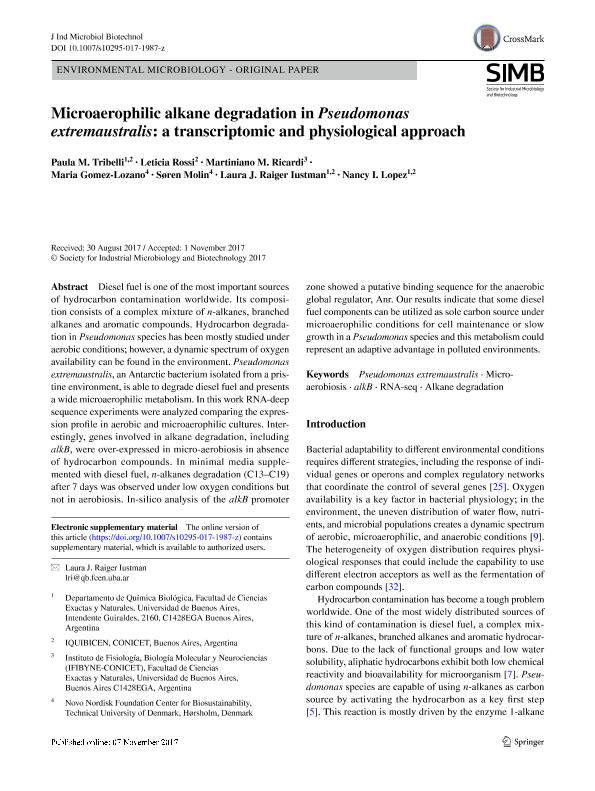Artículo
Microaerophilic alkane degradation in Pseudomonas extremaustralis: a transcriptomic and physiological approach
Tribelli, Paula Maria ; Rossi, Leticia; Ricardi, Martiniano María
; Rossi, Leticia; Ricardi, Martiniano María ; Gomez Lozano, Maria; Molin, Søren; Raiger Iustman, Laura Judith
; Gomez Lozano, Maria; Molin, Søren; Raiger Iustman, Laura Judith ; López, Nancy Irene
; López, Nancy Irene
 ; Rossi, Leticia; Ricardi, Martiniano María
; Rossi, Leticia; Ricardi, Martiniano María ; Gomez Lozano, Maria; Molin, Søren; Raiger Iustman, Laura Judith
; Gomez Lozano, Maria; Molin, Søren; Raiger Iustman, Laura Judith ; López, Nancy Irene
; López, Nancy Irene
Fecha de publicación:
01/2018
Editorial:
Springer Heidelberg
Revista:
Journal of Industrial Microbiology & Biotechnology
ISSN:
1367-5435
e-ISSN:
1476-5535
Idioma:
Inglés
Tipo de recurso:
Artículo publicado
Clasificación temática:
Resumen
Diesel fuel is one of the most important sources of hydrocarbon contamination worldwide. Its composition consists of a complex mixture of n-alkanes, branched alkanes and aromatic compounds. Hydrocarbon degradation in Pseudomonas species has been mostly studied under aerobic conditions; however, a dynamic spectrum of oxygen availability can be found in the environment. Pseudomonas extremaustralis, an Antarctic bacterium isolated from a pristine environment, is able to degrade diesel fuel and presents a wide microaerophilic metabolism. In this work RNA-deep sequence experiments were analyzed comparing the expression profile in aerobic and microaerophilic cultures. Interestingly, genes involved in alkane degradation, including alkB, were over-expressed in micro-aerobiosis in absence of hydrocarbon compounds. In minimal media supplemented with diesel fuel, n-alkanes degradation (C13–C19) after 7 days was observed under low oxygen conditions but not in aerobiosis. In-silico analysis of the alkB promoter zone showed a putative binding sequence for the anaerobic global regulator, Anr. Our results indicate that some diesel fuel components can be utilized as sole carbon source under microaerophilic conditions for cell maintenance or slow growth in a Pseudomonas species and this metabolism could represent an adaptive advantage in polluted environments.
Palabras clave:
Alkane Degradation
,
Alkb
,
Micro-Aerobiosis
,
Pseudomonas Extremaustralis
,
Rna-Seq
Archivos asociados
Licencia
Identificadores
Colecciones
Articulos(IQUIBICEN)
Articulos de INSTITUTO DE QUIMICA BIOLOGICA DE LA FACULTAD DE CS. EXACTAS Y NATURALES
Articulos de INSTITUTO DE QUIMICA BIOLOGICA DE LA FACULTAD DE CS. EXACTAS Y NATURALES
Citación
Tribelli, Paula Maria; Rossi, Leticia; Ricardi, Martiniano María; Gomez Lozano, Maria; Molin, Søren; et al.; Microaerophilic alkane degradation in Pseudomonas extremaustralis: a transcriptomic and physiological approach
; Springer Heidelberg; Journal of Industrial Microbiology & Biotechnology; 45; 1; 1-2018; 15-23
Compartir
Altmétricas



